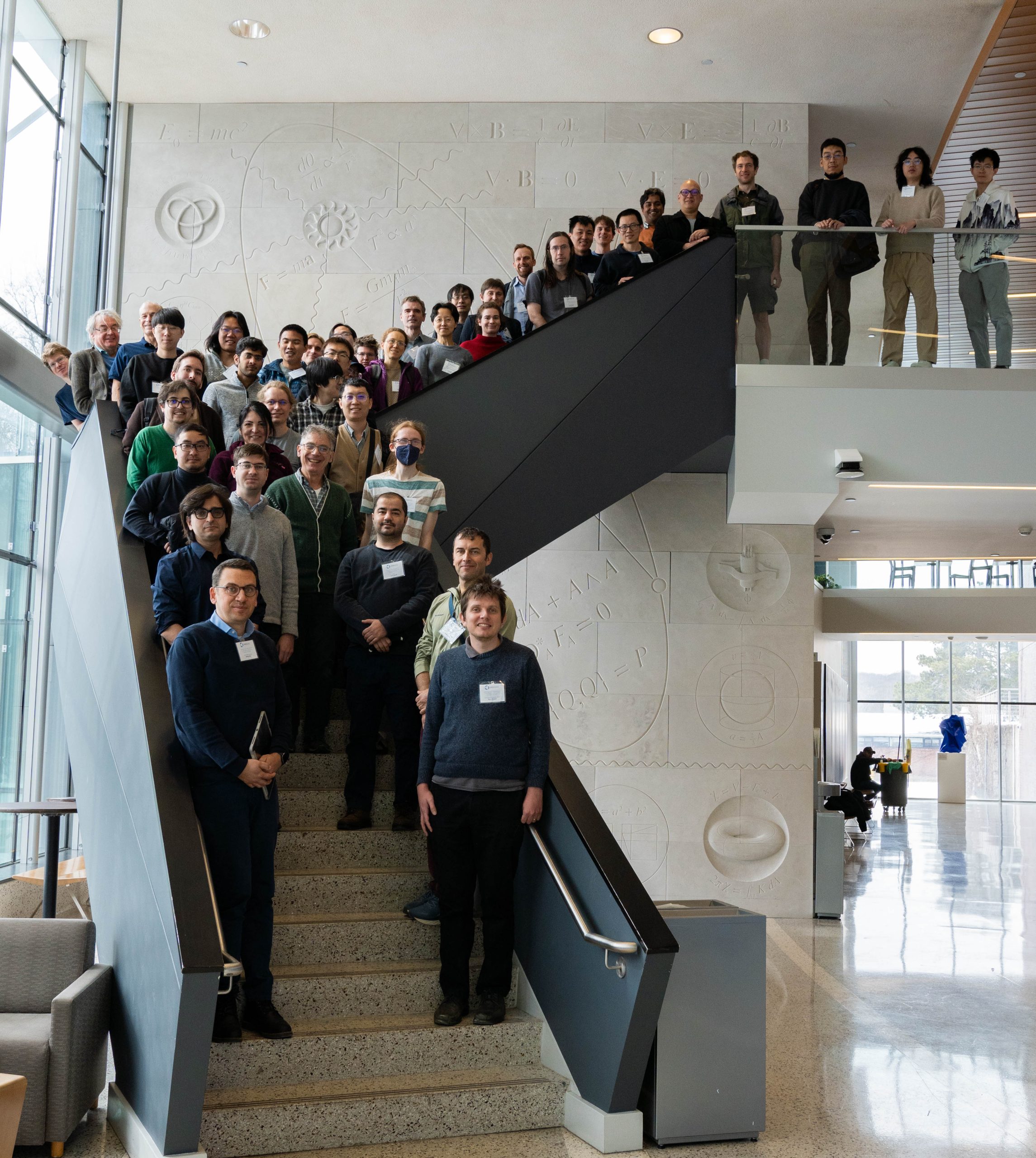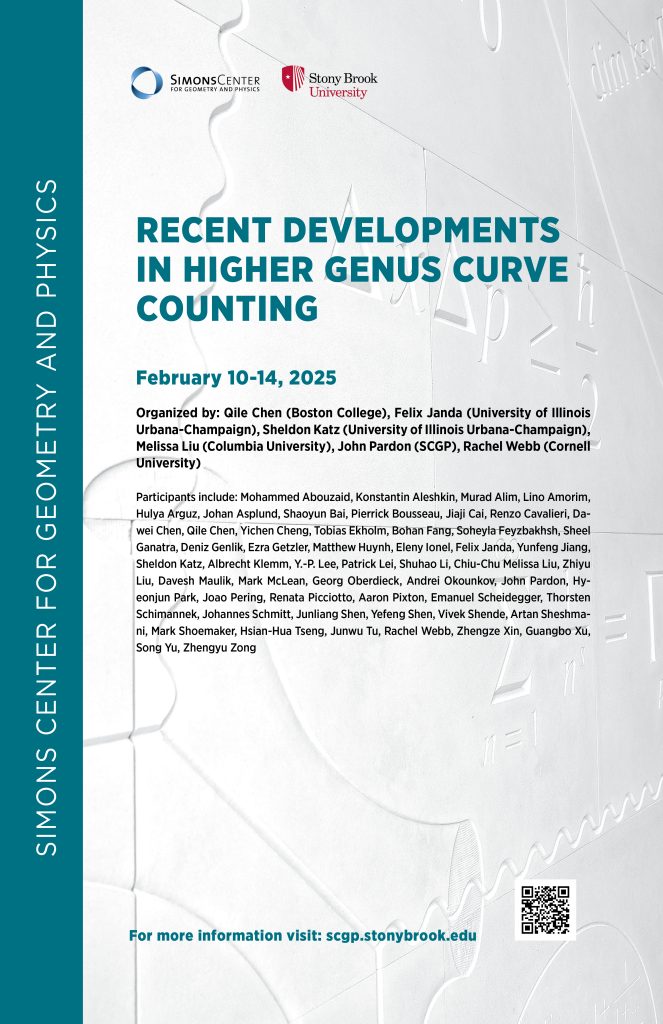Participant ListView VideosScheduleDanfords Shuttle
Organized by:
- Qile Chen (Boston College)
- Felix Janda (University of Illinois Urbana-Champaign)
- Sheldon Katz (University of Illinois Urbana-Champaign)
- Melissa Liu (Columbia University)
- John Pardon (SCGP)
- Rachel Webb (Cornell University)
Modern curve-counting theories were in part inspired by the work of physicists yet have active lives of their own as interesting and rich mathematical notions with connections to many areas of mathematics. A plethora of enumerative invariants have been developed, including Gromov–Witten (GW) invariants, Donaldson–Thomas (DT) invariants, Fan–Jarvis–Ruan–Witten (FJRW) invariants, GLSM invariants, as well as variants of these curve-counting theories. Many conjectures about enumerative invariants have arisen from physics, providing both deep insight as well as strategies for effective computation. Several of these conjectures have been proven in recent years, sometimes in their original form, and other times after the conjecture has been translated into a mathematically more natural framework. This workshop will focus on the higher genus curve counts from multiple angles, including geometric, computational and categorical perspectives.
This workshop is associated with the program: Recent developments in higher genus curve counting: January 6 – February 28, 2025

Talk Schedule
| Time | Title | Speaker | Location |
| 8:30am | Breakfast | N/A | SCGP Cafe |
| 9:30am | Symplectic Invariants on Calabi-Yau 3 folds, Modularity and Stability | Albrecht Klemm | SCGP 102 |
| 10:30am | Coffee Break | N/A | SCGP Cafe |
| 11:00am | From Gromov-Witten to Donaldson-Thomas invariants via Resurgence | Murad Alim | SCGP 102 |
| 12:00pm | Lunch | N/A | SCGP Cafe |
| 2:30pm | Topological strings on nodal Calabi-Yau with topologically non-trivial B-fields | Thorsten Schimannek | SCGP 102 |
| 3:30pm | Tea Time | N/A | SCGP Cafe |
| 4:00pm | Enumerative invariants via Wilson loops | Sheldon Katz | SCGP 102 |
| Time | Title | Speaker | Location |
| 8:30am | Breakfast | N/A | SCGP Cafe |
| 9:30am | Logarithmic tautological rings | Johannes Schmitt | SCGP 102 |
| 10:30am | Coffee Break | N/A | SCGP Cafe |
| 11:00am | Gromov-Witten theory of Enriques surfaces and quasi-modular forms | Georg Oberdieck | SCGP 102 |
| 12:00pm | Group photo | N/A | SCGP Lobby |
| 12:00pm | Lunch | N/A | SCGP Cafe |
| 1:00pm | Double ramification cycles, admissible covers, and the top degree part | Aaron Pixton | SCGP 102 |
| 2:15pm | Break | N/A | SCGP Cafe |
| 2:30pm | Castelnuovo bound conjecture and curve-counting invariants | Zhiyu Liu | SCGP 102 |
| 3:30pm | Tea Time | N/A | SCGP Cafe |
| 4:00pm | Perverse filtrations and refined Gopakumar-Vafa invariants for local surfaces | Junliang Shen | SCGP 102 |
| Time | Title | Speaker | Location |
| 8:30am | Breakfast | N/A | SCGP Cafe |
| 9:30am | Modular forms from Betti numbers | Pierrick Bousseau | SCGP 102 |
| 10:30am | Coffee Break | N/A | SCGP Cafe |
| 11:00am | Global Kuranishi charts for symplectic Gromov-Witten theory | Amanda Hirschi | SCGP 102 |
| 12:00pm | Lunch | N/A | SCGP Cafe |
| 1:00pm | Tropical psi classes and tropicalizations of psi classes | Renzo Cavalieri | SCGP 102 |
| 2:15pm | Break | N/A | SCGP Cafe |
| 2:30pm | Gromov-Witten theory of complete intersections | Hülya Argüz | SCGP 102 |
| 4:30pm | Tea Time | N/A | SCGP Cafe |
| 5:00pm | Mirrors of Sound: A Musical Odyssey | Performance by Liya Nigmati | SCGP 103 |
| 6:00pm | Banquet | N/A | SCGP Cafe |
| Time | Title | Speaker | Location |
| 8:30am | Breakfast | N/A | SCGP Cafe |
| 9:30am | Genus 1 Gromov-Witten invariants of Hilbert scheme of points on the affine plane | Hsian-Hua Tseng | SCGP 102 |
| 10:30am | Coffee Break | N/A | SCGP Cafe |
| 11:00am | Homological mirror symmetry for Batyrev mirror pairs | Sheel Ganatra | SCGP 102 |
| 12:00pm | Lunch | N/A | SCGP Cafe |
| 1:00pm | Integer-valued Gromov-Witten invariants | Guangbo Xu | SCGP 102 |
| 2:15pm | Break | N/A | SCGP Cafe |
| 2:30pm | Local and global in enumerative geometry | Andrei Okounkov | SCGP 102 |
| 3:30pm | Tea Time | N/A | SCGP Cafe |
| 4:00pm | Bordism valued GW invariants | Mohammed Abouzaid | SCGP 102 |
| Time | Title | Speaker | Location |
| 8:30am | Breakfast | N/A | SCGP Cafe |
| 9:30am | Symplectic pushforwards and DT theory | Hyeonjun Park | SCGP 102 |
| 10:30am | Coffee Break | N/A | SCGP Cafe |
| 11:00am | The quantum spectrum and Gamma structure for standard flips | Yefeng Shen | SCGP 102 |
| 12:00pm | Lunch | N/A | SCGP Cafe |


